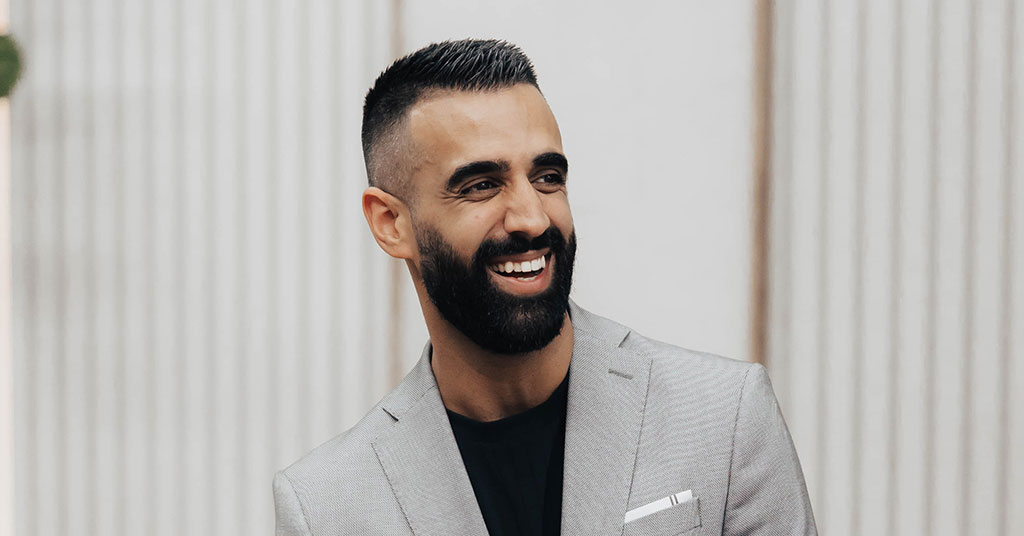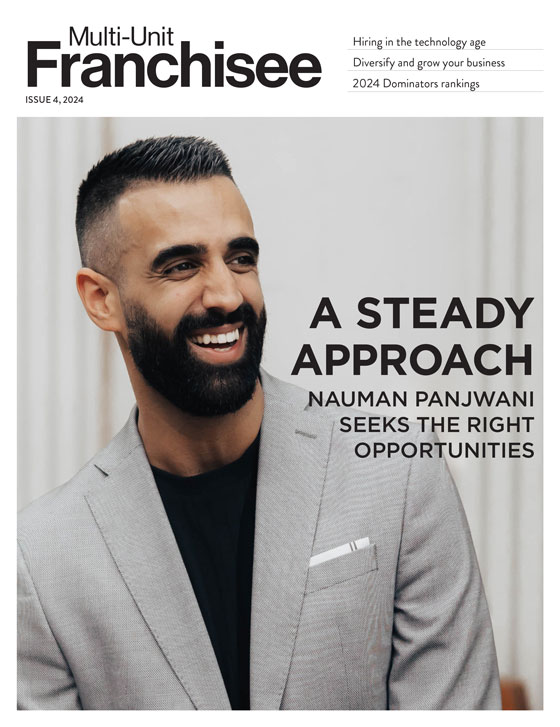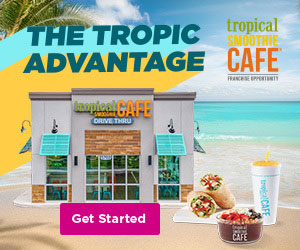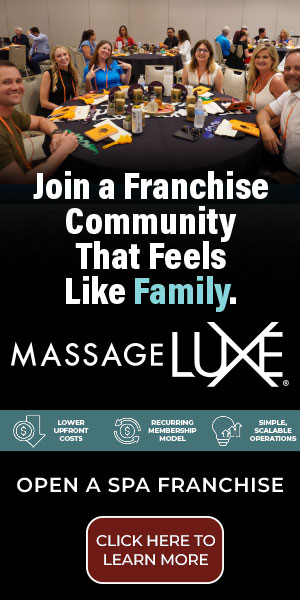"Creating a Launchpad": Seeking the Right Opportunities and Partnerships

Name: Nauman Panjwani
Title: Partner
Company: SNS Investment Group
No. of units: 4 Hilton Hotels, 1 Marriott Hotel, 1 Choice Hotels, 17 Total Wireless by Verizon
Age: 30
Family: Single
Years in franchising: 10
Years in current position: 6.5
At 22, Nauman Panjwani was earning "close to six figures" but decided to ditch his corporate finance job close to home, move to Washington, D.C., and work for Uber's corporate office. He was on contract, making $14 per hour with no benefits.
"Everyone in their right mind thought I was absolutely crazy," Panjwani says. "You can imagine telling your parents, who were entrepreneurs, that you are moving away to make far less money. For me, it was about chasing the right opportunity and seeing how one of the biggest and best organizations operates. I wanted to surround myself with the right people, learn from them, and be part of something bigger."
Despite the financial sacrifice, Panjwani says he had a phenomenal experience at Uber, and it set him up for the next step of his career. He briefly worked for his brother's hotel chain before becoming a partner and executive vice president of SNS Investment Group. The firm develops and manages commercial real estate projects, including several in the hotel industry. Panjwani is a franchisee of six hotels and 17 Total Wireless by Verizon locations.
At 30, Panjwani says he prefers a steady approach to growth rather than pursuing a specific unit count. Expansion is based on partnerships with other like-minded people so that they can grow together. His group recently formed a strategic partnership with ARK Hospitality, a third-party management company within the franchise space that operates more than 60 hotels.
"It's about picking the right opportunities at the right time and realizing nothing comes overnight," he says. "The process is similar to the first hotel we built. People driving by may only see when the shovels go in the ground and when it is being constructed, and that may take 12 to 24 months. What they don't see is the years of work that came before that with site selection, financing, and permitting. It takes time, patience, and hard work, but the ultimate outcome can be great."
Panjwani says he's focused growing his business in a sustainable way. "It's more about each business or investment being top of class than it is about having a unit count," he says.
Personal
First job: I spent weekends stocking the cooler and working the cash register at my father's gas station, Zip-n-Go, when I was 12 or 13. My first formal job was grading papers at Kumon Learning Center when I was 14.
Formative influences/events: I participated in an organization called Model United Nations when I was in college that prepared me for mock trials and debates focused on national diplomacy. I learned a lot of soft skills, such as critical thinking, negotiations, and public speaking. Early on, I had a comfortable career in the corporate finance world, but I knew it wasn't for me. I took a contract position with Uber for a lot less money than I had been making. It was more about chasing the right opportunity than the money. It helped me get my foot in the door with the company and helped set up the rest of my career.
Key accomplishments: 1) We've always acquired hotels, but we were in the middle of building our first one when Covid struck. Finishing construction on our own for that asset and then opening in a time when there was nobody traveling was incredibly difficult. We did not receive PPP or EIDL support either. 2) I had the privilege to be the youngest member of an executive design committee tasked with creating the new prototype for Choice Hotels' flagship Comfort Inn brand.
Biggest current challenge: Creating structure across industries. We've expanded past just franchising and real estate, so growing in an organized manner is my top priority right now.
Next big goal: We just recently formed a strategic partnership with a larger hospitality management company, ARK Hospitality. They are exceptional at what they do in the third-party management space and are really taking the industry by storm. I would love to help that entity fulfill its potential to become one of the largest management companies in the hotel space.
First turning point in your career: The first deal I sourced myself. We all deal with a bit of imposter syndrome, and I think this really helped something click internally.
Best business decision: Joining my first industry board. It can be a lonely world as an entrepreneur, and I don't think I would have stuck around if I didn't have the community outlet that came from joining like-minded individuals and giving back.
Hardest lesson learned: Always bond your projects when it comes to new construction/development.
Work week: The responsibilities don't stop, but I've tried to prioritize myself and my personal relationships a bit more on the weekends these days. In general, though, 60 to 70 hours with one to two days of being a road warrior tossed in there.
Exercise/workout: Anything that involves an activity, not just a gym. For example, I grew up dancing hip-hop and Bollywood fusion. It will get your heart rate up, and you'll have a blast.
Best advice you ever got: It's not about what happens to you in this world; it's about how you respond. The more conscious you are in your responses, you begin to train your reactions.
What's your passion in business? I love leveraging relationships to build businesses and organizations. It sounds pretty simple, but I think I just like to build things.
How do you balance life and work? If we're being honest, I'm still figuring this one out. I think it's less about creating a divide between the two where they're conflicting priorities and more about blending them.
Guilty pleasure: Any and everything chocolate. I've never met a chocolate chip cookie that didn't have my name on it.
Favorite book: The Alchemist by Paulo Coelho or Greenlights by Matthew McConaughey.
Favorite movie: "Space Jam." Gotta respect the classics.
What do most people not know about you? I graduated from high school and began college at the age of 16... by accident.
Pet peeve: When people constantly cut others off in conversation.
What did you want to be when you grew up? A direct quote from when I was six: "I want to be a scientist, a police officer, or a typist."
Last vacation: Vancouver in March.
Person you'd most like to have lunch with: Naval Ravikant, Sahil Bloom, or Tim Ferriss. Maybe a group lunch with all of them?
Management
Business philosophy: If you never ask, you'll never get. That is the equivalent of closed mouths never getting fed.
Management method or style: If you join the team, you're joining the family. As is true with family, I will protect you, push you, and want what's best for everyone. It won't always be easy, but I've got your back. And I hope you'll do the same.
Greatest challenge: Balancing priorities. When everything seems important, being able to discern what truly is.
How do others describe you? Nauman's never met a stranger.
Have you ever been in a mentor-mentee relationship? What did you learn? Not a formal mentor relationship. From those informal conversations I've sought out, I have learned, and am still learning, how to balance the demands of an entrepreneurial lifestyle while still prioritizing the relationships around me and my personal well-being.
One thing you're looking to do better: Balance the demands of the life of an entrepreneur while still prioritizing the relationships around me.
How you give your team room to innovate and experiment: A lot of people say, "If it ain't broke, don't fix it." I think that can be the case when you're trying to stay afloat or get a project off the ground, but in order to gain efficiencies or maximize results, you have to experiment, iterate, and innovate.
How close are you to operations? Extremely. On the hotel side, we manage our own assets, and we are part of a larger management company. I'm still on site at the different assets on a weekly basis and working with the team to make sure we track the way we need to track.
What are the two most important things you rely on from your franchisor? Brand recognition and operational/marketing support.
What you need from vendors: Fair pricing and efficient supply chain operations.
Have you changed your marketing strategy in response to the economy? How? The budget has gone up significantly, and the need to meet people where they're at has become the priority. Gone are the days of billboards and flyers. Everything is digital and short-form content.
How is social media affecting your business? It is everything! I use LinkedIn to leverage relationships and Facebook/Instagram/TikTok to drive brand identity and marketing.
How do you hire and fire? Tactically, we use a lot of Indeed. Ideally, we find talent through word of mouth and referrals.
How do you train and retain? A lot of it is on-the-job training. Of course, online platforms will teach you the 101s of the system and your job, but true learning comes from shadowing and simply doing. Retaining comes with fair pay and respect.
How do you deal with problem employees? Always give them a chance to share their side and then try to guide them back to where they need to be.
Fastest way into your doghouse: Be disrespectful not just to me or members of leadership but just in general. I was raised with the philosophy that you treat the janitor the same way you treat the CEO.
Bottom Line
Annual revenue: More than $20 million
2024/2025 goals: We're building a foundation right now. Our upcoming goals aren't a financial figure but creating a launchpad for exponential future growth through partnerships. We want to grow in a sustainable way with the right partners and assets.
Growth meter: How do you measure your growth? I've always said that I want to sustainably expand rather than grow for growth's sake. It's more about each business or investment being top of class than it is about having a unit count. With that, each hotel or each unit should index higher than its comp set and maintain year-over-year growth in key KPIs.
Vision meter: Where do you want to be in five years? 10 years? I don't have the desire to be the largest operator or investor in any one brand or sector but more to build a family of companies across our commercial real estate and franchise segments. I want our hospitality management company to be top five in the nation, our commercial real estate division to have three to five quality assets in each of the asset classes we operate (hospitality, multi-family, retail), our cell phone portfolio to have exited at a healthy multiple, and to continue to invest in technology startups and private equity funds. More importantly, I want a quality of life where financial success does not outweigh experiential success.
Do you have brands in different segments? Why/why not? Yes. Diversification is key!
How is the economy in your region(s) affecting you, your employees, your customers? Things are certainly getting tighter. Inflation hits hourly wage earners the most, and then this trickles into disposable income folks have to spend in our businesses.
Are you experiencing economic growth in your market? Most markets are closer to flat than growing, but in some years, that is a measure of growth itself.
How do changes in the economy affect the way you do business? It is something to be aware of and adapt to but never call a complete audible.
How do you forecast for your business? Review past performance and strategize how to improve from there.
What are the best sources for capital expansion? Partnerships with like-minded individuals coming together to grow. There is a lot of money out there, but it is harder to find smart capital. If there is a growth opportunity, let's see how we can grow together. Let me bring two or three others to the table and do a joint venture.
Experience with private equity, local banks, national banks, other institutions? Why/why not? We participate in private equity funds as investors, but for our day-to-day operations and growth, we've found the most amount of success from local and regional banks. We work with companies that are familiar with our workings rather than us just being a number on a screen for them. The relationship-based lending has been everything in good times and bad.
What are you doing to take care of your employees? We love to do spot bonuses, random shout-outs, and help them with their goals outside of work, such as supporting their efforts to buy a new car or their first home.
How are you handling rising employee costs (payroll, minimum wage, healthcare, etc.)? It's the nature of the business. We try to control costs in general but not at the expense of our people. If I have a certain budget and stick to it when the market is paying higher, I won't be able to get the employees I want. The person you pay a higher wage will more than make up for the additional expenses through their performance.
What laws and regulations are affecting your business, and how are you dealing with them? The biggest effect on us on a micro level is from the overtime laws that have gone into effect this year and will affect us next year. We have restructured how we categorize certain employees and how many people we can afford to employ within the businesses on the leadership side.
How do you reward/recognize top-performing employees? If we're doing well, then the team that contributed to that success deserves to share in the financial and recognition-based glory. We try to give bonuses across the board. If we have a good year, everyone should be compensated for it.
What kind of exit strategy do you have in place? Exit? We're just getting started...
Share this Feature
Recommended Reading:
| ADVERTISE | SPONSORED CONTENT |
FRANCHISE TOPICS
- Multi-Unit Franchising
- Get Started in Franchising
- Franchise Growth
- Franchise Operations
- Open New Units
- Franchise Leadership
- Franchise Marketing
- Technology
- Franchise Law
- Franchise Awards
- Franchise Rankings
- Franchise Trends
- Franchise Development
- Featured Franchise Stories
FEATURED IN

Multi-Unit Franchisee Magazine: Issue 4, 2024
| ADVERTISE | SPONSORED CONTENT |

$200,000
$500,000





 The multi-unit franchise opportunities listed above are not related to or endorsed by Multi-Unit Franchisee or Franchise Update Media Group. We are not engaged in, supporting, or endorsing any specific franchise, business opportunity, company or individual. No statement in this site is to be construed as a recommendation. We encourage prospective franchise buyers to perform extensive due diligence when considering a franchise opportunity.
The multi-unit franchise opportunities listed above are not related to or endorsed by Multi-Unit Franchisee or Franchise Update Media Group. We are not engaged in, supporting, or endorsing any specific franchise, business opportunity, company or individual. No statement in this site is to be construed as a recommendation. We encourage prospective franchise buyers to perform extensive due diligence when considering a franchise opportunity.